Contents
Market Overview
Macro Review
Evergrande escapes technical default. At least not for now, although the market is still trading the bond curve without accrued interest, implying default has already occurred. The coupon was paid the day after Evergrande extended the maturity and modified the collateral package of Jumbo Financial (considered a private placement). Aside from Evergrande, the initial weakness in the property sector was triggered by Modern Land. Modern Land rescinded a consent solicitation that had high approval to partially pay its 2021 maturity and extend the notes by three months. Instead the company will likely default on this instrument on Monday. These events ended up overshadowing China’s improved retail sales, along with its 3Q GDP (4.9%), while CNH volatility picked up on Evergrande headline risk. Away from China, the S&P recorded seven consecutive daily gains, which put the index on its best run since June 2021. Meanwhile, the VIX is back to lows last seen in February 2020 as the S&P has gained 4.5% since earnings season began two weeks ago. Over in Europe, the Bank of England have become paranoid about inflation, while the Central Bank of Russia seems paralyzed by it. This comes as U.S. 5yr breakevens moved to all-time highs, responding to European 5y5y inflation swaps at highs last seen in 2014, as the ECB seem set to keep monetary policy on a dovish setting. Perhaps slightly more dovish after the Bundesbank’s chief hawk stepped down. Russia is a good example of extremes. The Central Bank hiked rates by 75bp, well ahead of consensus (25bp). On the flip-side, Turkey’s CBRT cut rates by 200bp when consensus was only a 100bp cut. On the topic of misguided expectations, the Federal Reserve have enhanced governance measures associated with personal trading that saw Kaplan and Rosengren resign, and drew unwarranted attention on Clarida as well as Chair Powell. Finally, we are keeping one eye on the UK’s COVID situation which reflects more than 20% of all global daily cases, where daily cases could rise to over 100,000 this winter.
EM Credit Update
EM Credit ended the week down 0.5% as U.S. Treasury curvature became more convex. We note that the belly (5yr/7yr/10yr) widened 10bp relative to the front-end and long-end only widening 5-7bp. Belize, Lithuania and Papua New Guinea outperformed, while Tunisia, El Salvador and Ecuador lagged. The focus remains on Brazil with the equity ETF (EWZ) down 10% this week, as CDS widened 40bp to 240bp, local 10yr rates widened 105bp and the USD sovereign curve was approximately 25bp wider.
The Week Ahead
The focus next week will rest on the ECB given global inflation dynamics. Most of the inflation moves this week have been driven by Bank of England commentary and ECB dovishness, aside from U.S. earning commentary weighing on U.S. 5yr breakevens. Of equal importance will be the U.S. 3Q GDP reading, especially as the Atlanta GDPNow fell to its lowest level since July 2020 (0.5%). Beyond that, the UK Chancellor of Exchequer will deliver the autumn Budget on Wednesday, perhaps indicating the same inflationary pressures that the Bank of England’s Chief Economist did on Thursday. Elsewhere, China’s Manufacturing PMI and industrial production data is due, followed by Hong Kong’s trade deficit reading and further scrutiny will be on whether the Bank of Japan cut the country’s growth forecast. Rate decisions are due out of Brazil (6.25%), Colombia (2.0%), Egypt (8.25%) and Kazakhstan (9.5%). Then given the 200bp cut in the Turkish policy rate, a significant degree of attention will be on the latest inflation readings on Thursday.
Highlights from emerging markets discussed below include: The Turkish Central Bank’s (CBRT) aggressive monetary policy; a Peru rating and outlook cut, Castillo to challenge law approved to reduce Presidential power; and Global Emerging Markets Corporates in Focus: Currency conundrums.
Fixed Income
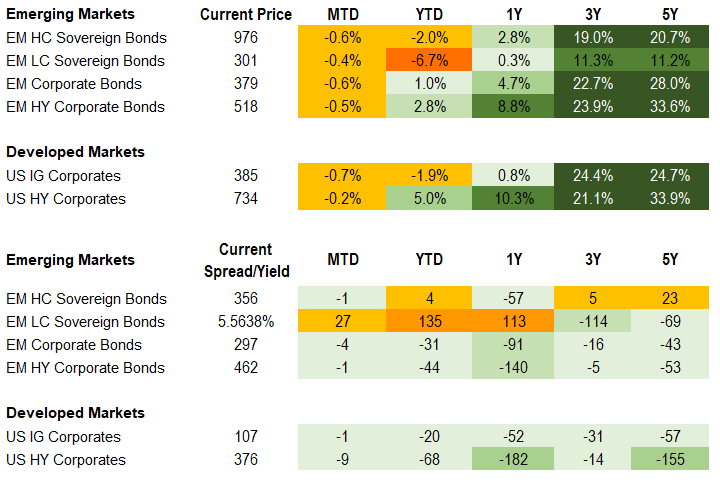
Equities
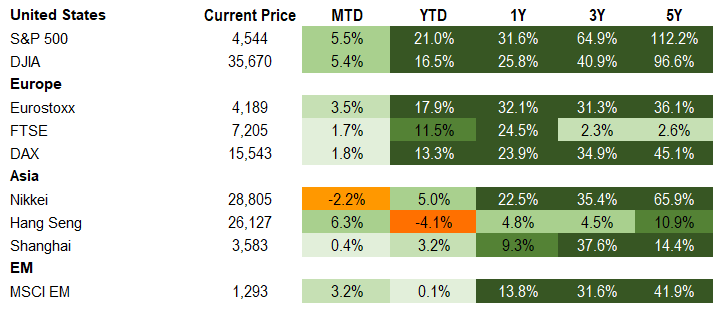
Commodities

Source for data tables: Bloomberg, JPMorgan, Gramercy. EM Fixed Income is represented by the following JPMorgan Indicies: EMBI Global, GBI-EM Global Diversified, CEMBI Broad Diversified and CEMBI Broad High Yield. DM Fixed Income is represented by the JPMorgan JULI Total Return Index and Domestic High Yield Index. Fixed Income, Equity and Commodity data is as of October 22, 2021 (mid-afternoon).
Emerging Markets Weekly Highlights
The Turkish Central Bank’s (CBRT) aggressive monetary policy easing pushes onshore real interest rates deeply in negative territory, could be a test of domestic investor confidence
Event: The CBRT cut its main policy rate by 200bps this week to 16% versus market consensus of 100bps and the latest headline inflation print of close to 20% YoY.
Gramercy Commentary: Continued policy easing comes on the heels of President Erdogan’s decision to fire three of CBRT’s more hawkish leaning Monetary Policy Committee (MPC) members by a midnight decree last week. As we warned in our commentary last week, premature rate cuts (in our view) were likely to continue under mounting political pressure to deliver growth-friendly policies. However, the size of the cut surprised us to the upside, which we believe opens the door to even further FX weakness and general market volatility. The reaction function of domestic savers/investors and the trajectory of inflation will be the key market signposts going forward. Onshore ex-post real interest rates are now deeply negative (~-3.5%), which has historically triggered stronger dollarization tendencies by domestic economic actors. This is a significant risk for the battered TRY, EM’s worst performing currency this year. A further downward spiral in the currency could be avoided if expected disinflation (driven by base effects) in 4Q21 is supported by the CBRT remaining on pause for the rest of the year. However, if the CBRT’s reaction functions remains detached from Turkey’s macroeconomic realities, we cannot exclude a potential breakdown in domestic market confidence that has remained resilient thus far in the face of a consistently deteriorating economic policy environment. From an external perspective, the current policy mix exacerbates Turkey’s vulnerabilities to global macro headwinds in the form of gradual tightening of financial conditions and higher energy prices, among others. Against this challenging backdrop, we remain vigilant about significant market risk in the coming months. This being said, we have a more constructive medium-term outlook and will be watching for tactical opportunities in the event a market dislocation occurs.
Peru rating and outlook cut; Castillo to challenge law approved to reduce Presidential power
Event: Fitch cut its rating of Peru one notch to BBB with a stable outlook from BBB+ while S&P lowered its outlook to negative on its BBB+ rating. Both actions were a function of the ongoing political uncertainty and associated growth and fiscal headwinds. Meanwhile, the Peruvian Congress approved a law that raises the bar for the President to invoke a vote of confidence, which if denied twice provides the President with the ability to dissolve Congress. Under the new law, the President can only ask for a vote of confidence on policies and no longer in the context of constitutional reforms. President Castillo has asked the Constitutional Court for a review on the premise that the new legislation is unconstitutional.
Gramercy Commentary: The credit rating deterioration is in line with our expectations as outlined in previous commentary. We see room for continued downward pressure despite some recent attempts at moderation, although we do not envision near-term loss of investment grade status absent a drastic policy shock. The aim to limit the President’s power and in theory improve governability is on the margin positive in terms of political intent outside of the ruling party. However, Castillo’s response to have the law declared unconstitutional speaks to his ultimate allegiance and/or a need to balance his party’s ideology. We do not expect any material improvement to the policymaking backdrop in the near term and thus envisage limitations on investment and growth as well as ongoing noise.
Global Emerging Markets Corporates in Focus: Currency conundrums
Event: Weakness in some emerging markets currencies has increased the focus on the ability of corporates to weather such challenges.
Gramercy Commentary: How fast or otherwise a currency depreciates and recovers can determine the effect on corporates. Short-lived currency weakness is less likely to cause concern and gradual depreciation may give corporates sufficient time to adjust, also leading to fewer investor concerns. However, a marked devaluation may result in questions about the ability of corporates to repay foreign currency-denominated obligations. How the relevant authorities respond is also an important factor, defending the currency using reserves may be viewed as unsustainable, and the read-across for corporates may be negative. Raising benchmark rates can help address currency weakness, but may lead to higher interest payments on domestic debt by corporates, and households. Significant rate raises can mean banks report higher non-performing loans. Where the duration of banks’ liabilities is shorter than that of assets, such rate raises may also lead to temporary margin contraction. Business models also matter when a local currency weakens. For exporters, such weakness may be positive for revenues. Whether or not there is also a positive bottom line impact will depend on the currency of such exporters’ costs. Issuers with profitable foreign operations can also benefit from local currency weakness. Regulation can also play a part. For banks in particular, when there is significant currency volatility, regulatory forbearance may mean reported capital ratios and other figures are not impacted as supervisory bodies may allow lenders to use historical exchange rates or averages. Having said this, banks may still need to present figures excluding such forbearance measures, as the investor community often demands such transparency. Regulations regarding banks’ open currency positions and foreign currency lending and borrowing will also determine the effect of currency weakness on a country’s lenders. If currency volatility means the Eurobond market closes to issuers, existing foreign currency liquidity buffers may be vital to sustain repayments. Access to other markets for funding – including loan and other private securities markets, can also play a crucial role. Currency volatility in emerging markets presents threats as well as opportunities and some issuers will navigate these challenges better than others. Critical analysis of issuers’ currency disclosures, which is a feature of active portfolio management, will likely become even more important.
Emerging Markets Technicals
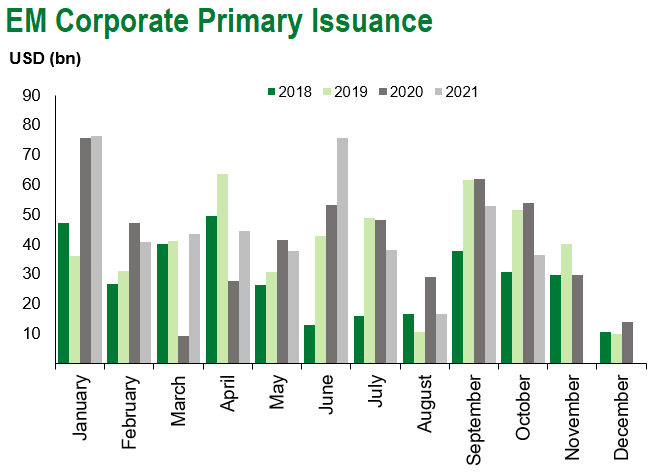
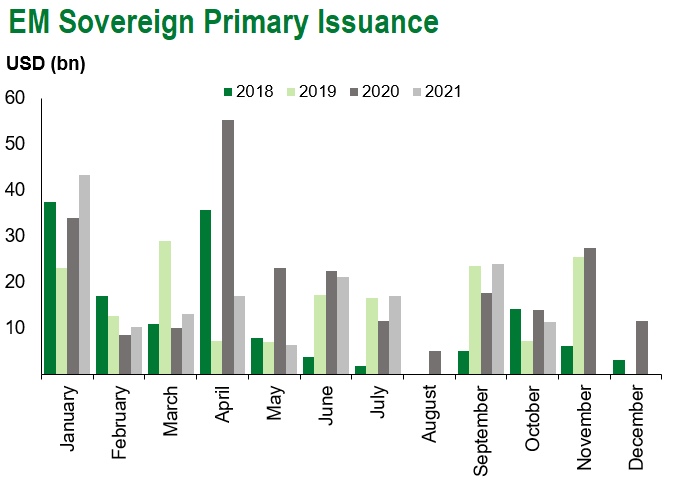
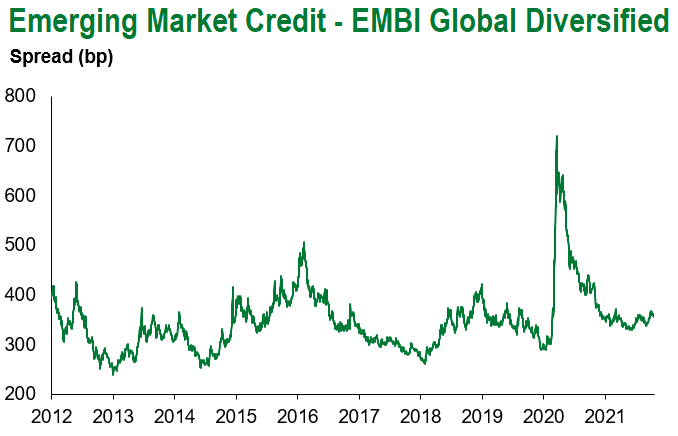
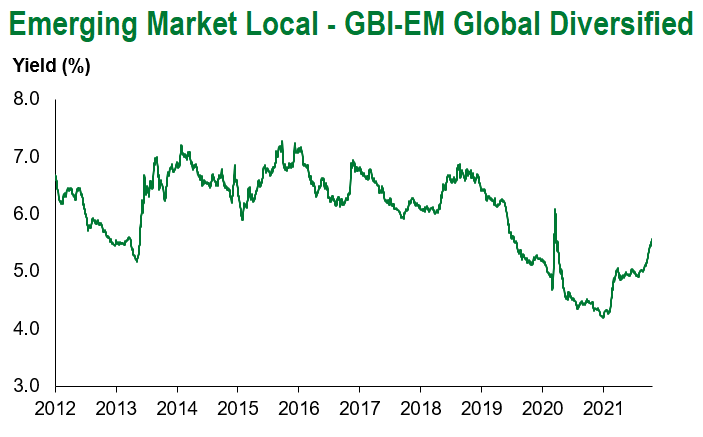
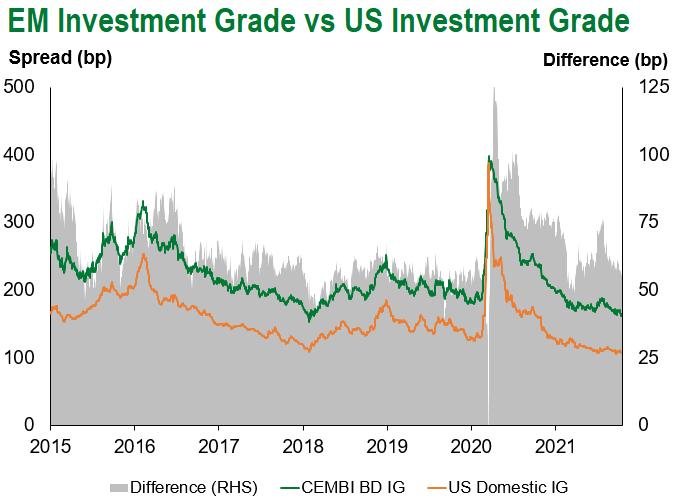
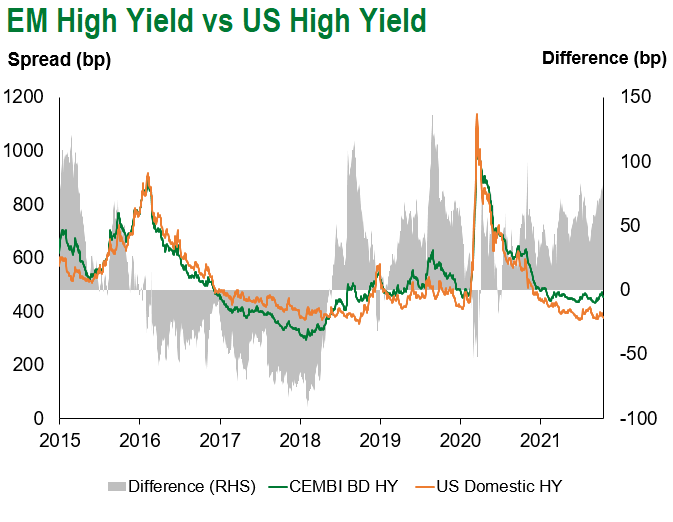
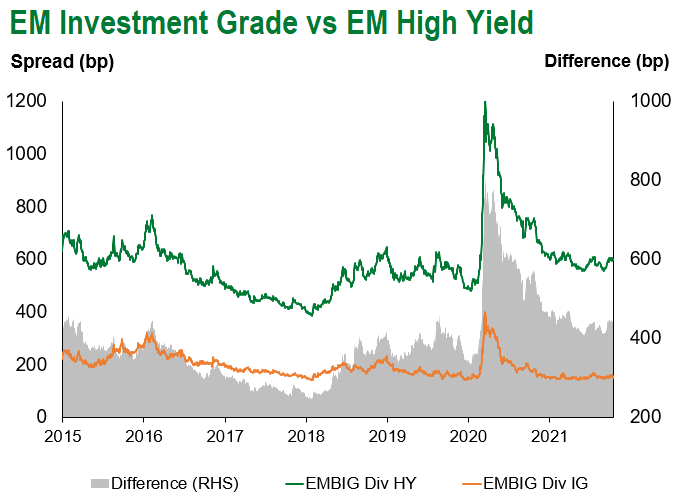
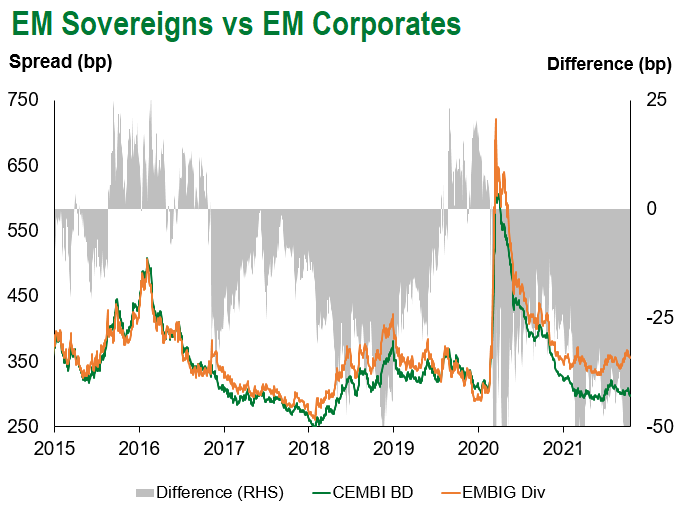
Emerging Markets Flows
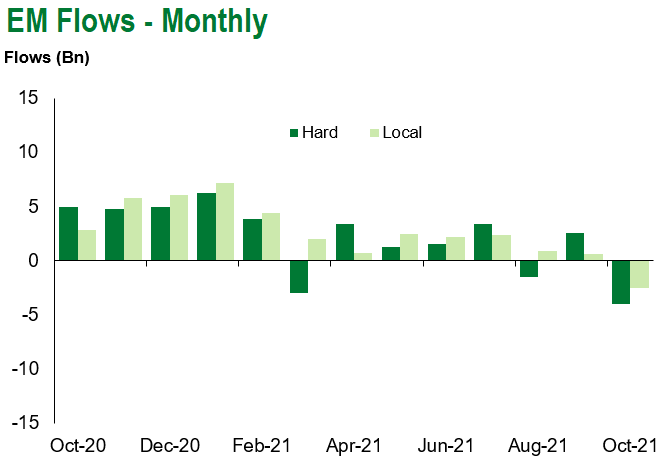
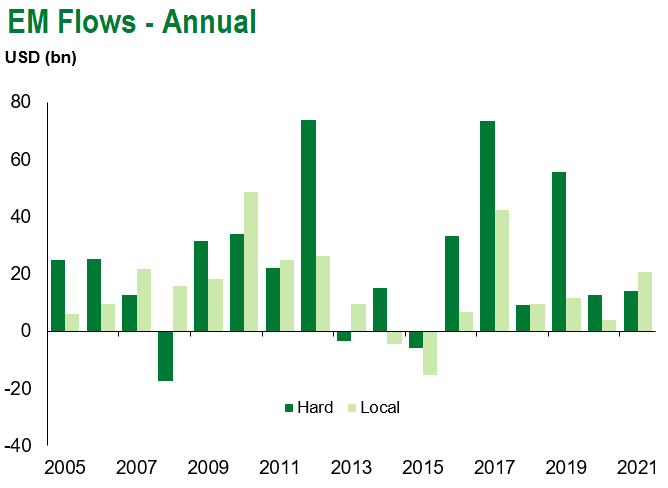
Source for graphs: Bloomberg, JPMorgan, Gramercy. As of October 22, 2021.
COVID Resources
Emerging Markets COVID-19 Case Summary
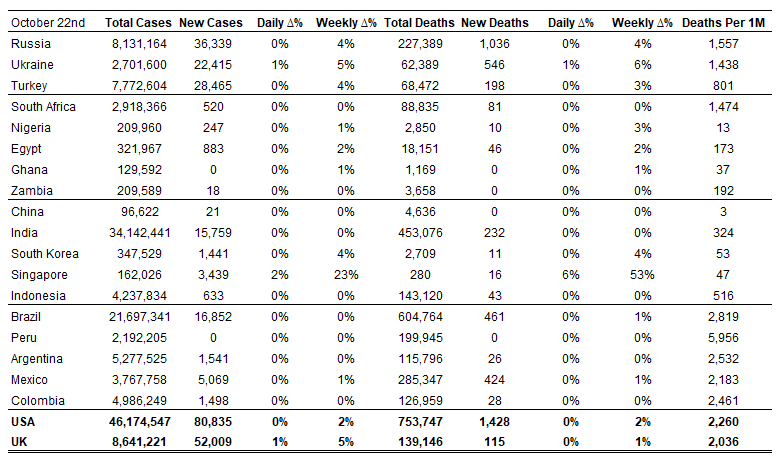
Source: Worldometer as of October 22, 2021.
Additional Crisis Resources:
Johns Hopkins COVID-19 Case Tracker
For questions, please contact:
Kathryn Exum, Senior Vice President, Sovereign Research Analyst, [email protected]
Petar Atanasov, Senior Vice President, Sovereign Research Analyst, [email protected]
Tolu Alamutu, CFA, Senior Vice President, Corporate Research Analyst, [email protected]
James Barry, Vice President, Corporate Research Analyst, [email protected]
This document is for informational purposes only. The information presented is not intended to be relied upon as a forecast, research or investment advice, and is not a recommendation, offer or solicitation to buy or sell any securities or to adopt any investment strategy. Gramercy may have current investment positions in the securities or sovereigns mentioned above. The information and opinions contained in this paper are as of the date of initial publication, derived from proprietary and nonproprietary sources deemed by Gramercy to be reliable, are not necessarily all-inclusive and are not guaranteed as to accuracy. This paper may contain “forward-looking” information that is not purely historical in nature. Such information may include, among other things, projections and forecasts. There is no guarantee that any forecasts made will come to pass. Reliance upon information in this paper is at the sole discretion of the reader. You should not rely on this presentation as the basis upon which to make an investment decision. Investment involves risk. There can be no assurance that investment objectives will be achieved. Investors must be prepared to bear the risk of a total loss of their investment. These risks are often heightened for investments in emerging/developing markets or smaller capital markets. International investing involves risks, including risks related to foreign currency, limited liquidity, less government regulation, and the possibility of substantial volatility due to adverse political, economic or other developments. The information provided herein is neither tax nor legal advice. Investors should speak to their tax professional for specific information regarding their tax situation.